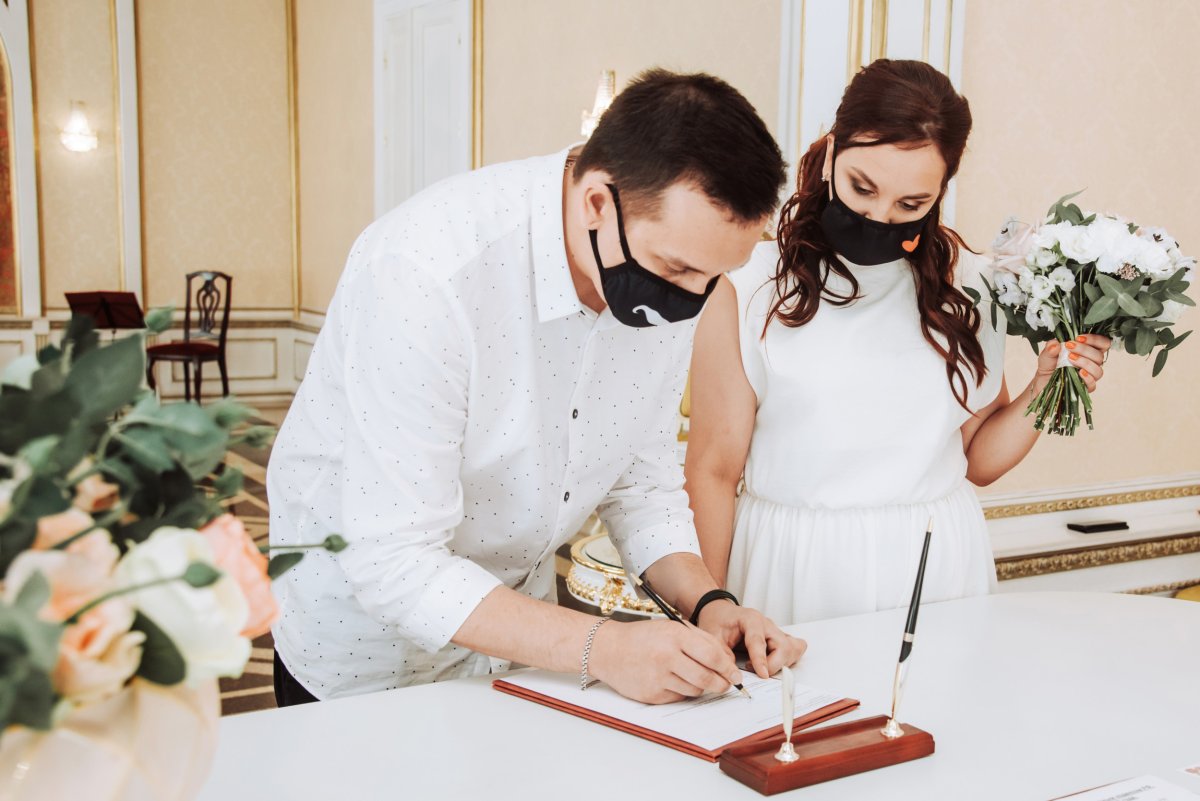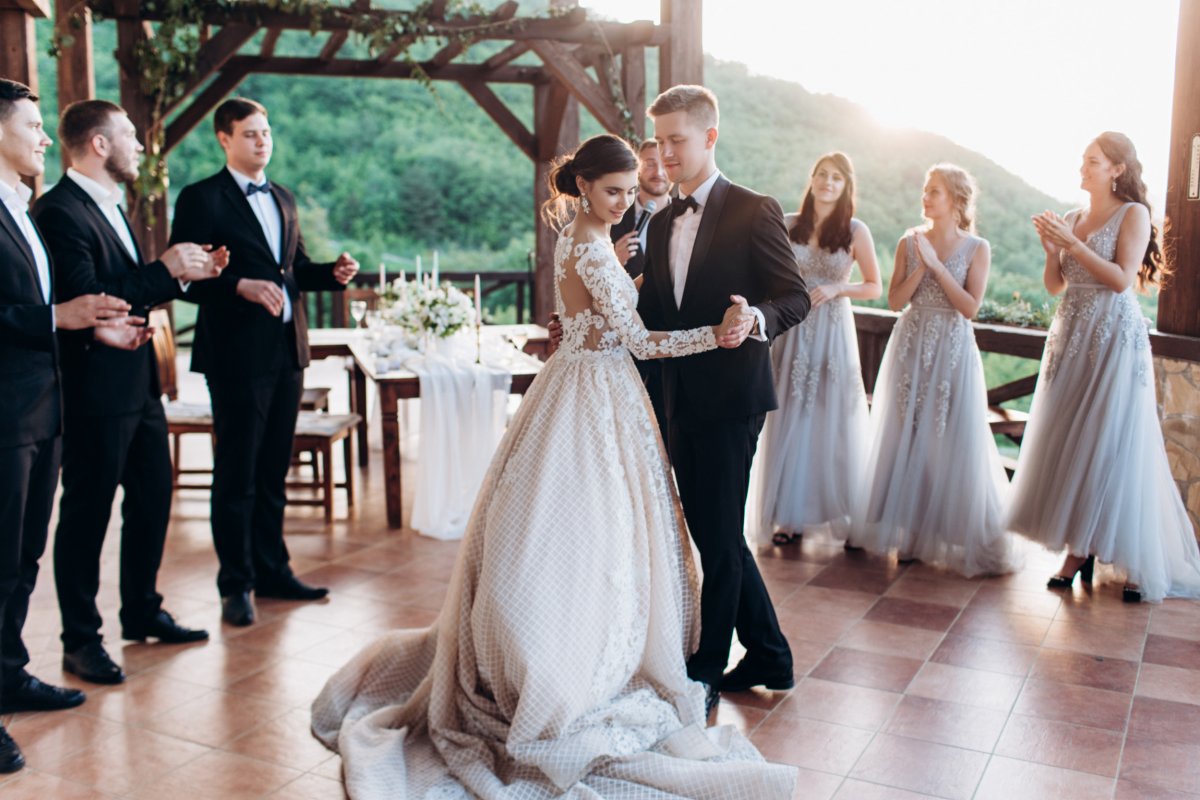The big, traditional white wedding has always been first choice for many couples, but as the COVID pandemic brought cancelations, delays, rules and restrictions, a new trend has emerged in the world of nuptials: the micro wedding.
Many brides and grooms have been forced to postpone their big day, drastically cut their guest lists or totally change their plans over the past year or so because of COVID. Overseas weddings have also become extremely difficult to pull off because of travel restrictions.
That's pushed people to get creative and rethink what's important to them. Usually much cheaper, easier to manage, more flexible, intimate and relaxed and even greener, micro weddings are gaining in popularity.
Experts in the world of weddings have given us their definition of micro weddings, and some ideas on how to make your day just as special if that's the path you choose.
What Is a Micro Wedding?
A micro wedding is exactly as it sounds: a wedding with fewer guests than usual.
In the U.K, restrictions on weddings meant that couples were only allowed 30 or fewer guests for most of 2020, if they could go ahead with their ceremony at all. In the U.S., different states have had different rules on weddings, making it even trickier to plan.
In August 2020, while North Dakota couples were allowed a 500-person indoor wedding, in Los Angeles, California, only members of the same household could gather to celebrate.
According to Anna Price Olson, Associate Editorial Director of Brides, a micro wedding may be defined by its smaller numbers. She says the pandemic has helped put these intimate gatherings on the map.

She said: "By definition, micro weddings have 50 or fewer guests. While couples have certainly gotten married in intimate ceremonies before, the idea of this micro wedding trend was truly defined by couples determined to get married during the pandemic!
"This past year has definitely been the year of the micro wedding, and the trend is here to stay, because beyond venue, health, and guest limitations, these smaller-scale events give couples the planning flexibility to invite who they want and throw the wedding wherever they want—whether the venue is their family home, their front stoop, or favorite restaurant."
Katherine McAlpine, director of The Brunel Museum, which is a regular wedding venue, said: "The mix of restrictions and ongoing uncertainty about when and how restrictions might be lifted has meant the larger weddings we're used to seeing, at around 100 guests, feel like a much riskier proposition.
"Instead, we're seeing more intimate weddings for smaller numbers– our lowest has been only 8 guests! This tends to be a solution for those couples from overseas who cannot travel home to have a big party but don't want to delay their nuptials.
"But it can also be a really intimate and special experience."
The Benefits of Micro Weddings

Each couple will have its own way of making a wedding special, whether it's through decorative touches, a sentimental music playlist or personalized vows.
One benefit that can come from a micro wedding is that if you have budgeted for a larger reception and ceremony then the money can instead be spent on smaller features to make the guests' experience more intimate.
Michal Kowalski of London-based florist Blooming Haus said: "Because couples are saving quite a bit of budget on a smaller wedding, we have found that couples are still maintaining the big floral budgets, which is seen as a crucial element to the day."
"Furthermore, and refreshingly, they have noticed the issue of sustainability is playing a bigger part in choosing a floral design.
"Couples realize that sourcing out of season flowers, such as peonies in the winter, involves importing them from thousands of miles, so working with the seasons is becoming far more common than before."
Much Easier to Get Married Sooner
Olson added that, with fewer guests, couples can get married sooner if they so wish, and not have to wait for the biggest and most expensive venue.
She said: "While there is definitely planning involved, a micro wedding is one way to get around the complexities of planning an elaborate wedding.
"Fewer guests mean you'll be spending less overall, and you'll have more options for your venue and food and beverages.
"As we emerge from the pandemic's social distancing rules, there is a backlog of couples planning postponed weddings and scooping up venues and dates, so if a couple is determined to host a traditional wedding at an in-demand venue, they might have to wait a year or two to do so."
Couples are also getting a little bit more creative with what they choose to do on their wedding day, standing out from the crowd.
Olson continued: "These are much more intimate and personal gatherings where a couple can spend real one-on-one time with their guests, something nearly impossible at a 300-guest affair.
"And, because it's only a small group, the celebrations are less formal and more reflective of the couple's personality—an intimate dinner at a meaningful restaurant, for example; a gathering over a favorite pizza, a picnic in the park, or a home-cooked meal at a family home."
Olson also explained how a couple can be more guest-focused, thinking of ideas that may not be possible with bigger numbers, such as snack stations around the venue, an elaborate meal made too expensive by large numbers, and even giving guests the chance to perform over dinner.
How to Let Down Uninvited Guests
Of course, for those who planned a big soiree to celebrate their nuptials, bringing the numbers down will mean some people who may have expected an invitation may not make the cut.
Many people have had to change their plans totally and do the best they can. With weddings, that's is especially hard, but McAlpine said it is all about managing expectations.
She told Newsweek: "Anyone who has ever been involved in wedding planning knows it's all about expectation management.
"My advice would be to write your core list of people you know you can't do without and then see if a micro wedding is for you.
"But we've also had couples who have had to be very clear with some guests that, if regulations changed again, they'd be uninvited!"
Olson also suggested a way to bring in guests is through video conferencing, with many venues allowing this as part of their packages.
She added: "This past year definitely forced couples to really look at their guest list and invite only their absolute nearest and dearest; those who have been there for them this year, and will be a constant part of their lives in the future.
The Task of Editing a Guest List
"Editing a guest list isn't an easy task for anyone, especially for those with large extended families, but generally, people are quite understanding of the circumstances. My advice is to just be honest with your guests, and share the news, whatever it is, then ask guests to join by video.
"The message can be as simple as: "We're having a small ceremony, but we'd love you to join by video." Incorporating a streaming service into your celebration is a way to include those who aren't able to attend in person."
In Kowalski's experience, guests have generally been understanding given the situation with COVID. People can also plan a separate party later on to allow more guests to come.
He said: "We have found a couple of weddings have gone ahead with the adhered to numbers, but the bridal couple is planning for a larger celebratory party when circumstances allow, which will give them chance to celebrate with a larger pool of friends.
"And, from what we're hearing, guests realize these are strange times and are happy to accommodate the bridal couple and wait for a future party."

Uncommon Knowledge
Newsweek is committed to challenging conventional wisdom and finding connections in the search for common ground.
Newsweek is committed to challenging conventional wisdom and finding connections in the search for common ground.
About the writer
To read how Newsweek uses AI as a newsroom tool, Click here.








